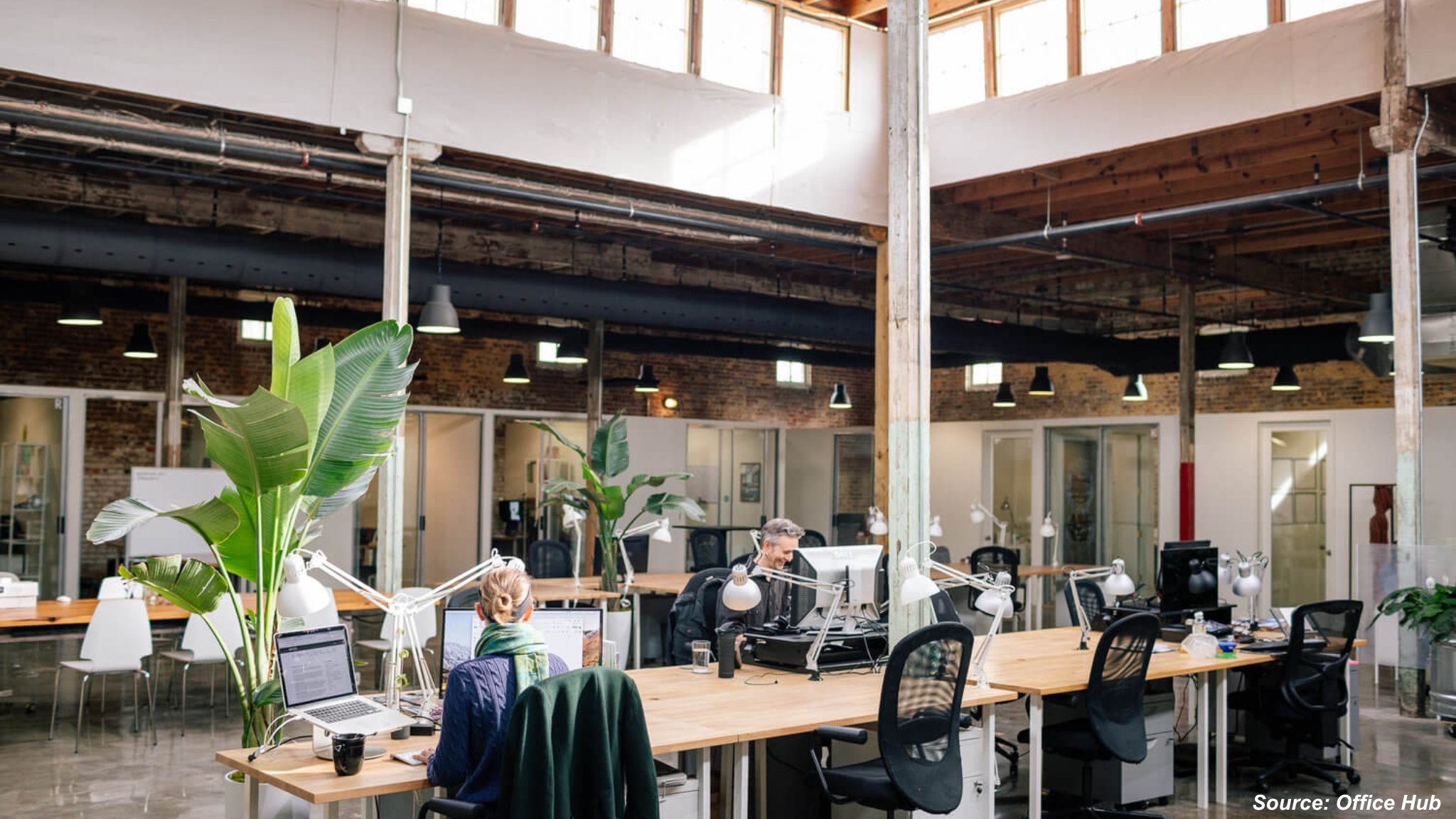How Emerging Tech is Reshaping Co-Working Spaces in 2025
Published: 2025-09-15

Introduction
The global Co-Working Space Market has undergone a remarkable transformation in recent years, fueled by advancements in technology and changing work preferences. As more and more professionals embrace flexible work arrangements and seek collaborative environments, co-working spaces have become increasingly popular.
In this blog, we will explore the impact of emerging technologies on managed workspaces and how these innovations are reshaping the way people work and collaborate. According to the report by Next Move Strategy Consulting (NMSC), the global market for co-working spaces recorded a revenue of USD 10.81 billion in 2023 and is projected to reach USD 36.92 billion by 2030, witnessing a CAGR of 19.1% from 2024 to 2030. Let us have a look at new and emerging technologies that are reshaping the flexible workspaces.
Curious about the Co-Working Space Market Report? Grab a FREE Sample Now!
Smart Building Solutions
One of the key trends driving innovation in the co-working space industry is the adoption of smart building solutions. These solutions leverage IoT sensors, smart lighting, and environmental monitoring systems to create more efficient and comfortable work environments than traditional office spaces. By optimizing energy usage and improving space utilization, smart buildings enhance the overall experience for co-working space occupants.
As an example, Hines introduced a smart building platform in Houston, revolutionizing workplace experiences with advanced technology. The Hines app offers convenient features, such as space reservations, food ordering, and fitness class scheduling. These features lead to enhanced user engagement and operational efficiency. This initiative reflects Hines' dedication to a people-centric approach and its step toward changing trends.
Collaboration Tools
Advanced collaboration tools and software platforms are another area of focus in the managed workspace industry. From video conferencing systems to digital whiteboards and project management tools, these technologies facilitate seamless communication and collaboration among co-working space tenants. With the rise of remote work, these tools play a crucial role in enabling virtual collaboration and enhancing productivity. Notably, Emporium Melbourne launched an innovative JustCo Coworking Hub in 2024. This launch offers modern work environments and amenities that aim to provide private offices, hot desks, tech-equipped meeting rooms, and specialized work areas. They feature biophilic designs and upscale amenities for members’ well-being. This initiative caters to post-pandemic work-life balance needs, blending workspaces with retail settings for a seamless work-leisure fusion.
Flexible Access Control
Innovative access control systems are revolutionizing the way people access flexible workspaces. Mobile-based entry systems, biometric authentication, and Radio Frequency Identification (RFID) technology provide tenants with flexible access options while ensuring security. These solutions offer convenience and flexibility, while allowing tenants to access the workspace on their terms. For example, India Accelerator launched a new 20,000 sq. ft. co-working space in Gurugram. It offers startups and Small and Medium Enterprises (SMEs) mentoring, networking, and fundraising opportunities. Furthermore, it provides premium amenities, such as conference rooms, biometric access, a cafeteria, and a gaming zone.
Workspace Management Platforms
Workspace management platforms are empowering co-working operators to streamline administrative tasks and optimize space utilization. These platforms provide real-time insights into space availability, facilitate desk and room bookings, and automate billing processes. By leveraging data analytics and business intelligence tools, co-working operators can make informed decisions to enhance the overall tenant experience. In 2024, WeWork Workplace partnered with Yardi to offer features such as seat booking, internal communications, calendar integration, team booking capabilities, and analytics on space utilization. This helps companies manage hybrid working models in a better manner. WeWork's exclusive digital-first subscription models and global-scale initiatives further distinguish the company from traditional real estate models.
Augmented Reality (AR) and Virtual Reality (VR)
AR and VR technologies are transforming the way people experience co-working spaces. Virtual tours, interactive floor plans, and virtual collaboration spaces enable tenants to explore and visualize co-working spaces remotely. These immersive experiences help tenants make informed decisions about workspace selection and customization, regardless of their location. For example, Meta offers Horizon Workroom which allows remote teams to hold meetings and work together in a virtual office. These workrooms feature spatial audio, customizable avatars, and collaborative whiteboards. These features boost engagement, reduce travel costs, and integrate with video conferencing tools.
Health and Wellness Solutions:
With an increased focus on health and wellness in the workplace, co-working spaces are integrating advanced technologies to support the well-being of occupants. Air quality monitoring systems, ergonomic furniture, fitness apps, and mindfulness programs promote physical and mental health in the workplace. These initiatives contribute to a more positive and productive work environment for co-working space occupants. As an example, Greenville coworking spaces are going beyond desks, offering wellness features such as fitness and meditation areas and social spaces to foster community. These features cater to the changing needs of professionals post-pandemic. The trend, seen in places such as Endeavor and The Loom, reflects a shift towards work-life balance and community in co-working spaces. This will likely influence the future spaces in Greenville and beyond.
Conclusion
In conclusion, as the co-working space industry continues to evolve, emerging technologies will play a pivotal role in shaping its future. From smart building solutions to collaboration tools and virtual reality experiences, these innovations are transforming the way people work and collaborate in co-working spaces. By embracing these technologies, co-working operators can create more efficient, comfortable, and productive work environments than before.
About the Author
 Shyam Gupta is a passionate and highly enthusiastic researcher with over four years of experience. He is dedicated to assisting clients in overcoming challenging business obstacles by providing actionable insights through exhaustive research. Shyam has a keen interest in various industries, including Construction and Manufacturing, ICT & Media, and Digital Transformation. He consistently endeavors to deliver valuable perspectives in these areas. In addition to his research work, Shyam enjoys sharing his thoughts and ideas through articles and blogs. During his leisure time, he finds solace in the world of literature and art, often engrossed in reading and expressing his creativity through painting.
Shyam Gupta is a passionate and highly enthusiastic researcher with over four years of experience. He is dedicated to assisting clients in overcoming challenging business obstacles by providing actionable insights through exhaustive research. Shyam has a keen interest in various industries, including Construction and Manufacturing, ICT & Media, and Digital Transformation. He consistently endeavors to deliver valuable perspectives in these areas. In addition to his research work, Shyam enjoys sharing his thoughts and ideas through articles and blogs. During his leisure time, he finds solace in the world of literature and art, often engrossed in reading and expressing his creativity through painting.
About the Reviewer
 Debashree Dey is a skilled Content Writer, PR Specialist, and Assistant Manager with strong expertise in Digital Marketing. She specializes in crafting visibility strategies and delivering impactful, data-driven campaigns. Passionate about creating engaging, audience-focused content, she helps brands strengthen their online presence. Beyond work, she draws inspiration from creative projects and design pursuits.
Debashree Dey is a skilled Content Writer, PR Specialist, and Assistant Manager with strong expertise in Digital Marketing. She specializes in crafting visibility strategies and delivering impactful, data-driven campaigns. Passionate about creating engaging, audience-focused content, she helps brands strengthen their online presence. Beyond work, she draws inspiration from creative projects and design pursuits.
















Add Comment